
- Customer Reviews
- Extended Essays
- IB Internal Assessment
- Theory of Knowledge
- Literature Review
- Dissertations
- Essay Writing
- Research Writing
- Assignment Help
- Capstone Projects
- College Application
- Online Class

How to Select a Research Topic: A Step-by-Step Guide
by Antony W
June 6, 2024
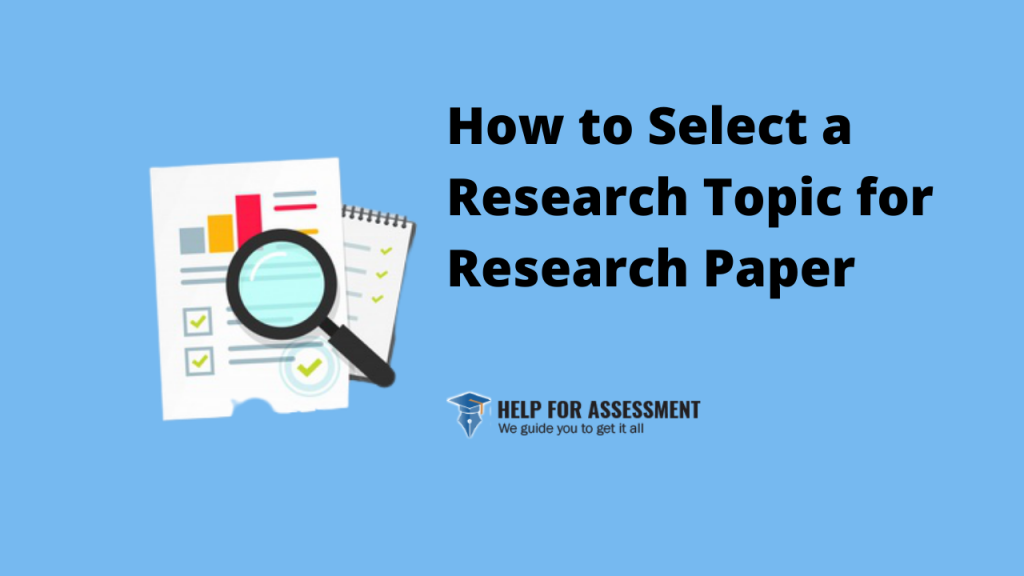
Learning how to select a research topic can be the difference between failing your assignment and writing a comprehensive research paper. That’s why in this guide we’ll teach you how to select a research topic step-by-step.
You don’t need this guide if your professor has already given you a list of topics to consider for your assignment . You can skip to our guide on how to write a research paper .
If they have left it up to you to choose a topic to investigate, which they must approve before you start working on your research study, we suggest that you read the process shared in this post.
Choosing a topic after finding your research problem is important because:
- The topic guides your research and gives you a mean to not only arrive at other interesting topics but also direct you to discover new knowledge
- The topic you choose will govern what you say and ensures you keep a logical flow of information.
Picking a topic for a research paper can be challenging and sometimes intimidating, but it’s not impossible. In the following section, we show you how to choose the best research topic that your instructor can approve after the first review.
How to Select a Research Topic
Below are four steps to follow to find the most suitable topic for your research paper assignment:
Step 1: Consider a Topic that Interests You
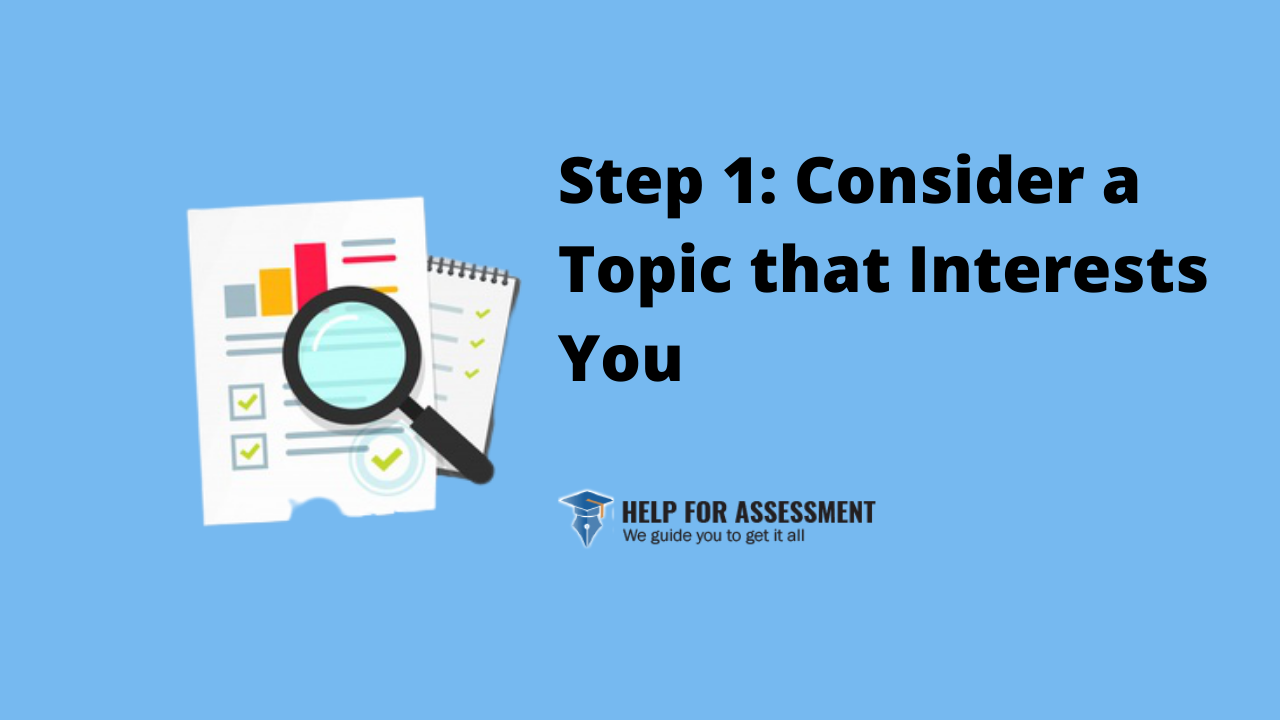
If your professor has asked you to choose a topic for your research paper, it means you can choose just about any subject to focus on in your area of study. A significant first step to take is to consider topics that interest you.
An interesting topic should meet two very important conditions.
First, it should be concise. The topic you choose should not be too broad or two narrow. Rather, it should be something focused on a specific issue. Second, the topic should allow you to find enough sources to cite in the research stage of your assignment.
The best way to determine if the research topic is interesting is to do some free writing for about 10 minutes. As you free write, think about the number of questions that people ask about the topic and try to consider why they’re important. These questions are important because they will make the research stage easier for you.
You’ll probably have a long list of interesting topics to consider for your research assignment. That’s a good first step because it means your options aren’t limited. However, you need to narrow down to only one topic for the assignment, so it’s time to start brainstorming.
Step 2: Brainstorm Your Topics
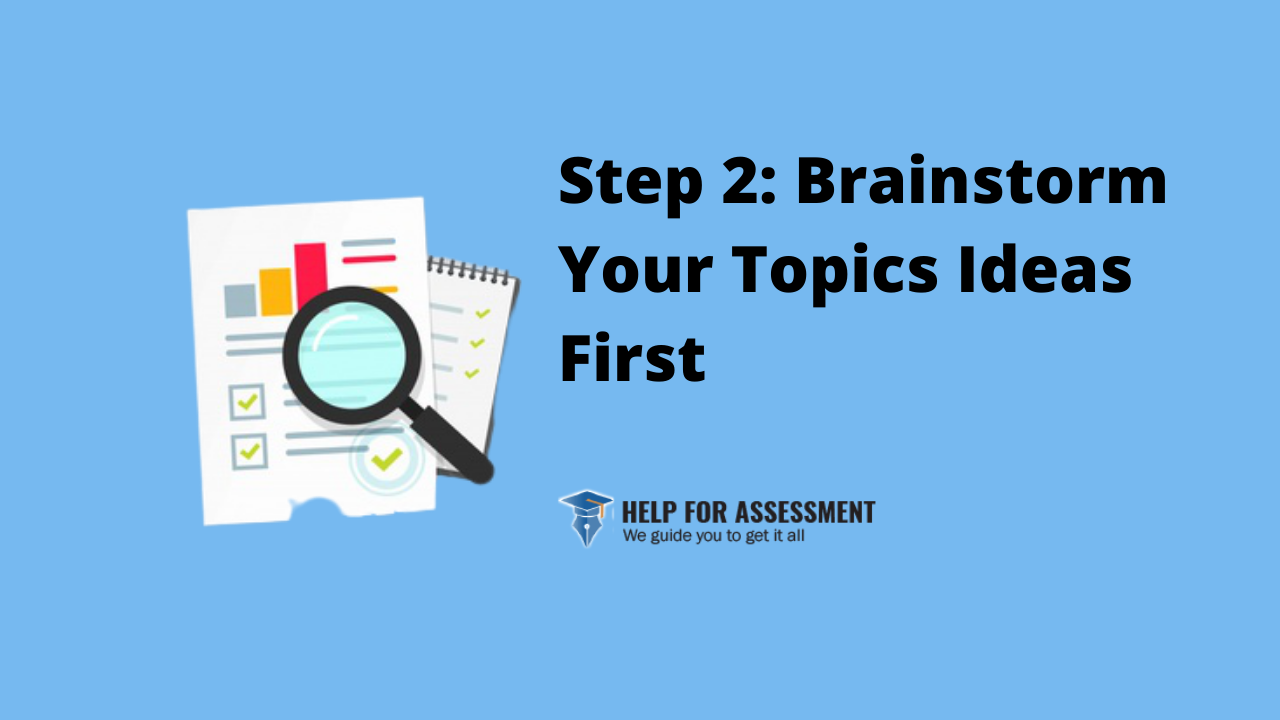
You aren’t doing research at this stage yet. You are only trying to make considerations to determine which topic will suit your research assignment.
The brainstorming stage isn’t difficult at all. It should take only a couple of hours or a few days depending on how you approach.
We recommend talking to your professor, classmates, and friends about the topics that you’ve picked and ask for their opinion. Expect mixed opinions from this audience and then consider the topics that make the most sense. Note what topics picked their interest the most and put them on top of the list.
You’ll end up removing some topics from your initial list after brainstorming, and that’s completely fine. The goal here is to end up with a topic that interests you as well as your readers.
Step 3: Define Your Topics
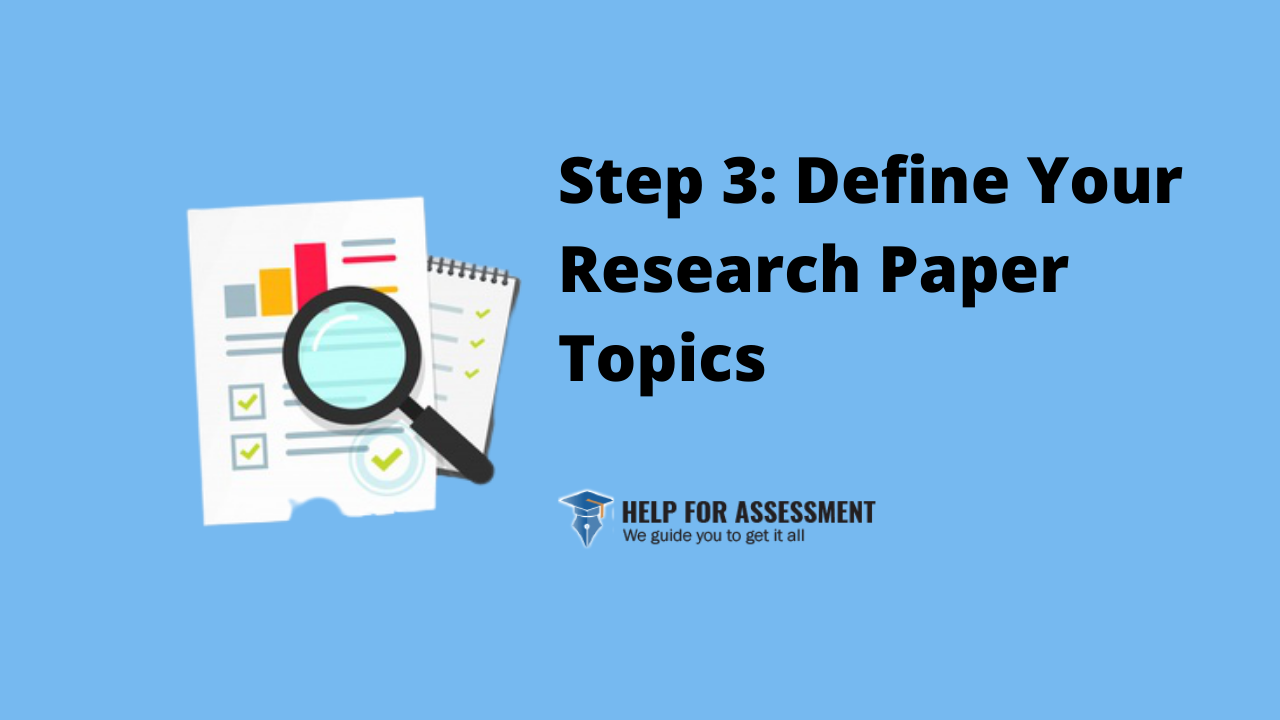
Check once again to make sure that your topic is a subject that you can easily define. You want to make sure the topic isn’t too broad or too narrow.
Often, a broad topic presents overwhelming amount of information, which makes it difficult to write a comprehensive research paper. A narrow topic, on the other hand, means you’ll find very little information, and therefore it can be difficult to do your assignment.
The length of the research paper, as stated in the assignment brief, should guide your topic selection.
Narrow down your list to topics that are:
- Broad enough to allows you to find enough scholarly articles and journals for reference
- Narrow enough to fit within the expected word count and the scope of the research
Topics that meet these two conditions should be easy to work on as they easily fit within the constraints of the research assignment.
Step 4: Read Background Information of Selected Topics
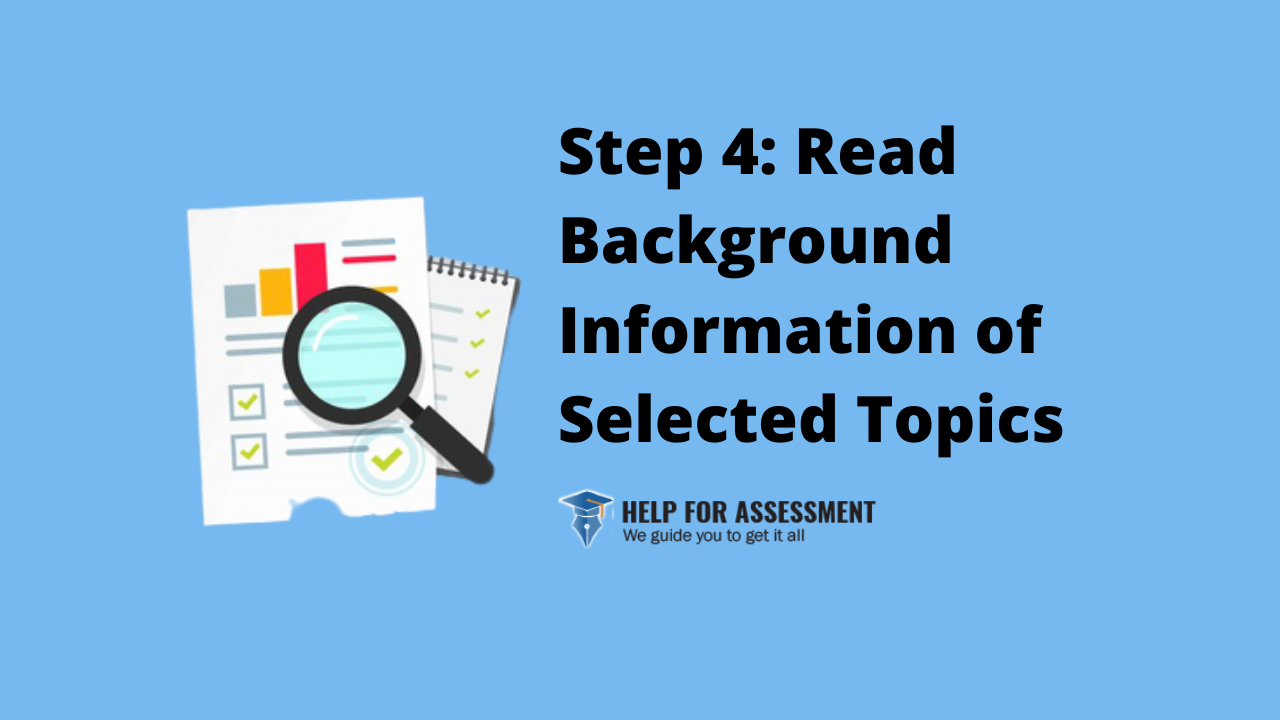
You probably have two or three topics by the time you get to this step. Now it’s time to read the background information on the topics to decide which topic to work on.
This step is important because it gives you a clear overview of the topic, enabling you to see how it relates to broader, narrower, and related concepts. Preliminary research also helps you to find keywords commonly used to describe the topic, which may be useful in further research.
It’s important to note how easy or difficult it is to find information on the topic.
Look at different sources of information to be sure you can find enough references for the topic. Such periodic indexes scan journals, newspaper articles, and magazines to find the information you’re looking for. You can even use web search engines. Google and Bing are currently that best options to consider because they make it easy for searchers to find relevant information on scholarly topics.
If you’re having a hard time to find references for a topic that you’ve so far considered for your research paper, skip it and go to the next one. Doing so will go a long way to ensure you have the right topic to work on from start to finish.
Get Research Paper Writing Help
If you’ve found your research topic but you feel so stuck that you can’t proceed with the assignment without some assistance, we are here to help. With our research paper writing service , we can help you handle the assignment within the shortest time possible.
We will research your topic, develop a research question, outline the project, and help you with writing. We also get you involved in the process, allowing you to track the progress of your order until the delivery stage.
About the author
Antony W is a professional writer and coach at Help for Assessment. He spends countless hours every day researching and writing great content filled with expert advice on how to write engaging essays, research papers, and assignments.
Selecting a Research Topic: Overview
- Refine your topic
- Background information & facts
- Writing help
Here are some resources to refer to when selecting a topic and preparing to write a paper:
- MIT Writing and Communication Center "Providing free professional advice about all types of writing and speaking to all members of the MIT community."
- Search Our Collections Find books about writing. Search by subject for: english language grammar; report writing handbooks; technical writing handbooks
- Blue Book of Grammar and Punctuation Online version of the book that provides examples and tips on grammar, punctuation, capitalization, and other writing rules.
- Select a topic
Choosing an interesting research topic is your first challenge. Here are some tips:
- Choose a topic that you are interested in! The research process is more relevant if you care about your topic.
- If your topic is too broad, you will find too much information and not be able to focus.
- Background reading can help you choose and limit the scope of your topic.
- Review the guidelines on topic selection outlined in your assignment. Ask your professor or TA for suggestions.
- Refer to lecture notes and required texts to refresh your knowledge of the course and assignment.
- Talk about research ideas with a friend. S/he may be able to help focus your topic by discussing issues that didn't occur to you at first.
- WHY did you choose the topic? What interests you about it? Do you have an opinion about the issues involved?
- WHO are the information providers on this topic? Who might publish information about it? Who is affected by the topic? Do you know of organizations or institutions affiliated with the topic?
- WHAT are the major questions for this topic? Is there a debate about the topic? Are there a range of issues and viewpoints to consider?
- WHERE is your topic important: at the local, national or international level? Are there specific places affected by the topic?
- WHEN is/was your topic important? Is it a current event or an historical issue? Do you want to compare your topic by time periods?
Table of contents
- Broaden your topic
- Information Navigator home
- Sources for facts - general
- Sources for facts - specific subjects
Start here for help
Ask Us Ask a question, make an appointment, give feedback, or visit us.
- Next: Refine your topic >>
- Last Updated: Jul 30, 2021 2:50 PM
- URL: https://libguides.mit.edu/select-topic

How To Choose A Research Topic
Step-By-Step Tutorial With Examples + Free Topic Evaluator
By: Derek Jansen (MBA) | Expert Reviewer: Dr Eunice Rautenbach | April 2024
Choosing the right research topic is likely the most important decision you’ll make on your dissertation or thesis journey. To make the right choice, you need to take a systematic approach and evaluate each of your candidate ideas across a consistent set of criteria. In this tutorial, we’ll unpack five essential criteria that will help you evaluate your prospective research ideas and choose a winner.
Overview: The “Big 5” Key Criteria
- Topic originality or novelty
- Value and significance
- Access to data and equipment
- Time limitations and implications
- Ethical requirements and constraints
Criterion #1: Originality & Novelty
As we’ve discussed extensively on this blog, originality in a research topic is essential. In other words, you need a clear research gap . The uniqueness of your topic determines its contribution to the field and its potential to stand out in the academic community. So, for each of your prospective topics, ask yourself the following questions:
- What research gap and research problem am I filling?
- Does my topic offer new insights?
- Am I combining existing ideas in a unique way?
- Am I taking a unique methodological approach?
To objectively evaluate the originality of each of your topic candidates, rate them on these aspects. This process will not only help in choosing a topic that stands out, but also one that can capture the interest of your audience and possibly contribute significantly to the field of study – which brings us to our next criterion.

Criterion #2: Value & Significance
Next, you’ll need to assess the value and significance of each prospective topic. To do this, you’ll need to ask some hard questions.
- Why is it important to explore these research questions?
- Who stands to benefit from this study?
- How will they benefit, specifically?
By clearly understanding and outlining the significance of each potential topic, you’ll not only be justifying your final choice – you’ll essentially be laying the groundwork for a persuasive research proposal , which is equally important.
Criterion #3: Access to Data & Equipment
Naturally, access to relevant data and equipment is crucial for the success of your research project. So, for each of your prospective topic ideas, you’ll need to evaluate whether you have the necessary resources to collect data and conduct your study.
Here are some questions to ask for each potential topic:
- Will I be able to access the sample of interest (e.g., people, animals, etc.)?
- Do I have (or can I get) access to the required equipment, at the time that I need it?
- Are there costs associated with any of this? If so, what are they?
Keep in mind that getting access to certain types of data may also require special permissions and legalities, especially if your topic involves vulnerable groups (patients, youths, etc.). You may also need to adhere to specific data protection laws, depending on the country. So, be sure to evaluate these aspects thoroughly for each topic. Overlooking any of these can lead to significant complications down the line.

Criterion #4: Time Requirements & Implications
Naturally, having a realistic timeline for each potential research idea is crucial. So, consider the scope of each potential topic and estimate how long each phase of the research will take — from literature review to data collection and analysis, to writing and revisions. Underestimating the time needed for a research project is extremely common , so it’s important to include buffer time for unforeseen delays.
Remember, efficient time management is not just about the duration but also about the timing . For example, if your research involves fieldwork, there may specific times of the year when this is most doable (or not doable at all). So, be sure to consider both time and timing for each of your prospective topics.
Criterion #5: Ethical Compliance
Failing to adhere to your university’s research ethics policy is a surefire way to get your proposal rejected . So, you’ll need to evaluate each topic for potential ethical issues, especially if your research involves human subjects, sensitive data, or has any potential environmental impact.
Remember that ethical compliance is not just a formality – it’s a responsibility to ensure the integrity and social responsibility of your research. Topics that pose significant ethical challenges are typically the first to be rejected, so you need to take this seriously. It’s also useful to keep in mind that some topics are more “ethically sensitive” than others , which usually means that they’ll require multiple levels of approval. Ideally, you want to avoid this additional admin, so mark down any prospective topics that fall into an ethical “grey zone”.
If you’re unsure about the details of your university’s ethics policy, ask for a copy or speak directly to your course coordinator. Don’t make any assumptions when it comes to research ethics!
Key Takeaways
In this post, we’ve explored how to choose a research topic using a systematic approach. To recap, the “Big 5” assessment criteria include:
- Topic originality and novelty
- Time requirements
- Ethical compliance
Be sure to grab a copy of our free research topic evaluator sheet here to fast-track your topic selection process. If you need hands-on help finding and refining a high-quality research topic for your dissertation or thesis, you can also check out our private coaching service .
Need a helping hand?
i need guidance on the choise of research topic.
I need help on research proposal
Hello I need help on choice of research topic in field of finance
Submit a Comment Cancel reply
Your email address will not be published. Required fields are marked *
Save my name, email, and website in this browser for the next time I comment.
- Print Friendly
Scholar Speak
Choosing a research topic.

Photo of bulb by AbsolutVision , licensed under Unsplash
Leave a Reply Cancel reply
Your email address will not be published. Required fields are marked *

Run by graduate student employees, Scholar Speak hopes to bridge the gap between the library and its students through instruction on the use of library services and resources.

Recent Posts
- Broaden your horizons! Libraries as far as the eye can see October 16, 2024
- Introspection from the Interlibrary Loan Office September 4, 2024
- Vinyl Record Collection at the UNT Music Library August 15, 2024
Additional Links
Apply now Schedule a tour Get more info
Disclaimer | AA/EOE/ADA | Privacy | Electronic Accessibility | Required Links | UNT Home
Purdue Online Writing Lab Purdue OWL® College of Liberal Arts
Choosing a Topic

Welcome to the Purdue OWL
This page is brought to you by the OWL at Purdue University. When printing this page, you must include the entire legal notice.
Copyright ©1995-2018 by The Writing Lab & The OWL at Purdue and Purdue University. All rights reserved. This material may not be published, reproduced, broadcast, rewritten, or redistributed without permission. Use of this site constitutes acceptance of our terms and conditions of fair use.
The first step of any research paper is for the student to understand the assignment. If this is not done, the student will often travel down many dead-end roads, wasting a great deal of time along the way. Do not hesitate to approach the instructor with questions if there is any confusion. A clear understanding of the assignment will allow you to focus on other aspects of the process, such as choosing a topic and identifying your audience.
A student will often encounter one of two situations when it comes to choosing a topic for a research paper. The first situation occurs when the instructor provides a list of topics from which the student may choose. These topics have been deemed worthy by the instructor; therefore, the student should be confident in the topic he chooses from the list. Many first-time researchers appreciate such an arrangement by the instructor because it eliminates the stress of having to decide upon a topic on their own.
However, the student may also find the topics that have been provided to be limiting; moreover, it is not uncommon for the student to have a topic in mind that does not fit with any of those provided. If this is the case, it is always beneficial to approach the instructor with one's ideas. Be respectful, and ask the instructor if the topic you have in mind would be a possible research option for the assignment. Remember, as a first-time researcher, your knowledge of the process is quite limited; the instructor is experienced, and may have very precise reasons for choosing the topics she has offered to the class. Trust that she has the best interests of the class in mind. If she likes the topic, great! If not, do not take it personally and choose the topic from the list that seems most interesting to you.
The second situation occurs when the instructor simply hands out an assignment sheet that covers the logistics of the research paper, but leaves the choice of topic up to the student. Typically, assignments in which students are given the opportunity to choose the topic require the topic to be relevant to some aspect of the course; so, keep this in mind as you begin a course in which you know there will be a research paper near the end. That way, you can be on the lookout for a topic that may interest you. Do not be anxious on account of a perceived lack of authority or knowledge about the topic chosen. Instead, realize that it takes practice to become an experienced researcher in any field.
For a discussion of Evaluating Sources, see Evaluating Sources of Information .
Methods for choosing a topic
Thinking early leads to starting early. If the student begins thinking about possible topics when the assignment is given, she has already begun the arduous, yet rewarding, task of planning and organization. Once she has made the assignment a priority in her mind, she may begin to have ideas throughout the day. Brainstorming is often a successful way for students to get some of these ideas down on paper. Seeing one's ideas in writing is often an impetus for the writing process. Though brainstorming is particularly effective when a topic has been chosen, it can also benefit the student who is unable to narrow a topic. It consists of a timed writing session during which the student jots down—often in list or bulleted form—any ideas that come to his mind. At the end of the timed period, the student will peruse his list for patterns of consistency. If it appears that something seems to be standing out in his mind more than others, it may be wise to pursue this as a topic possibility.
It is important for the student to keep in mind that an initial topic that you come up with may not be the exact topic about which you end up writing. Research topics are often fluid, and dictated more by the student's ongoing research than by the original chosen topic. Such fluidity is common in research, and should be embraced as one of its many characteristics.
The Purdue OWL also offers a number of other resources on choosing and developing a topic:
- Understanding Writing Assignments
- Starting the Writing Process
- Invention Slide Presentation
- SPECIAL COLLECTIONS
- COVID-19 Library Updates
- Make Appointment
Research 101 (A How-to Guide): Step 1. Choose a topic
- Step 1. Choose a topic
- Step 2. Get background information
- Step 3. Create a search strategy
- Step 4. Find books and e-books
- Step 5. Find articles
- Step 6. Evaluate your sources
- Step 7. Cite your sources
Step 1. Choose a Topic
Choosing an interesting research topic can be challenging. This video tutorial will help you select and properly scope your topic by employing questioning, free writing, and mind mapping techniques so that you can formulate a research question.
Good Sources for Finding a Topic
- CQ Researcher This link opens in a new window Browse the "hot topics" on the right hand side for inspiration.
- 401 Prompts for Argumentative Writing, New York Times Great questions to consider for argumentative essays.
- ProCon.org Facts, news, and thousands of diverse opinions on controversial issues in a pro-con format.
- Room For Debate, New York Times This website, created by editorial staff from the New York Times, explores close to 1,500 news events and other timely issues. Knowledgeable outside contributors provide subject background and readers may contribute their own views. Great help for choosing a topic!
- US News & World Report: Debate Club Pro/Con arguments on current issues.
- Writing Prompts, New York Times New York Times Opinion articles that are geared toward students and invite comment.
Tips for Choosing a Topic
- Choose a topic that interests you!
- Pick a manageable topic, not too broad, not too narrow. Reading background info can help you choose and limit the scope of your topic.
- Review lecture notes and class readings for ideas.
- Check with your instructor to make sure your topic fits with the assignment.
Picking your topic IS research!
- Developing a Research Question Worksheet
Mind Mapping Tools
Mind mapping, a visual form of brainstorming, is an effective technique for developing a topic. Here are some free tools to create mind maps.
- Bubbl.us Free account allows you to save 3 mind maps, download as image or HTML, and share with others.
- Coggle Sign in with your Google account to create maps that you can download as PDF or PNG or share with others.
- << Previous: Overview
- Next: Step 2. Get background information >>
- Last Updated: Sep 24, 2024 11:45 AM
- URL: https://libguides.depaul.edu/research101
- Boston University Libraries
Choosing a Research Topic
- Starting Points
Where to Find Ideas
Persuasive paper assignments, dissertations and theses.
- From Idea to Search
- Make It Manageable
If you are starting a research project and would like some help choosing the best topic, this guide is for you. Start by asking yourself these questions:
What does your instructor require? What interests you? What information sources can support your research? What is doable in the time you have?
While keeping these questions in mind, find suggestions in this guide to select a topic, turn that topic into a database search, and make your research manageable. You will also find more information in our About the Research Process guide.
Whether your instructor has given a range of possible topics to you or you have to come up with a topic on your own, you could benefit from these activities:
Consult Course Materials If a reading, film, or other resource is selected by your instructor, the subject of it is important to the course. You can often find inspiration for a paper in these materials.
- Is a broad topic presented? You can focus on a specific aspect of that topic. For example, if your class viewed a film on poverty in the United States, you could look at poverty in a specific city or explore how poverty affects Americans of a specific gender, ethnic group, or age range.
- Are experts presented, quoted, or cited? Look up their work in BU Libraries Search or Google Scholar .
Use Background Sources If you've identified one or more topics you'd like to investigate further, look them up in an encyclopedia, handbook, or other background information source. Here are some good places to start.
Online version of Encyclopædia Britannica along Merriam-Webster’s Collegiate Dictionary and Thesaurus, magazines and periodicals and other reference sources.
- Oxford Reference This link opens in a new window Published by Oxford University Press, it is a fully-indexed, cross-searchable database containing dictionaries, language reference and subject reference works.
Explore the Scholarly Literature Ask your instructor or a librarian to guide you to the top journals in the field you're studying. Scanning the tables of contents within these journals will provide some inspiration for your research project. As a bonus, each of the articles in these journals will have a bibliography that will lead you to related articles, books, and other materials.
Ask a Librarian We are here to help you! You can request a consultation or contact us by email or through our chat service . We can help you identify what interests you, where to find more about it, and how to narrow the topic to something manageable in the time you have.
If your assignment entails persuading a reader to adopt a position, you can conduct your research in the same way you would with any other research project. The biggest mistake you can make, however, is choosing a position before you start your research. Instead, the information you consult should inform your position. Researching before choosing a position is also much easier; you will be able to explore all sides of a topic rather than limiting yourself to one.
If you would like examples of debates on controversial topics, try these resources:
Covers the most current and controversial issues of the day with summaries, pros and cons, bibliographies and more. Provides reporting and analysis on issues in the news, including issues relating to health, social trends, criminal justice, international affairs, education, the environment, technology, and the economy.
- New York Times: Room for Debate Selections from the New York Times' opinion pages.
- ProCon.org Created by Britannica, this site exposes readers to two sides of timely arguments. Each article includes a bibliography of suggested resources.
If you are writing a dissertation or thesis, you will find more specialized information at our Guide for Writers of Theses and Dissertations .
If you would like to find published dissertations and theses, please use this database:
This database contains indexing and abstracts of American doctoral dissertations accepted at accredited institutions since 1861 and a selection from other countries. Masters level theses are included selectively.

- Next: From Idea to Search >>
- Last Updated: Sep 24, 2024 3:15 PM
- URL: https://library.bu.edu/choosing-a-topic
Have a language expert improve your writing
Run a free plagiarism check in 10 minutes, automatically generate references for free.
- Knowledge Base
- Research process
How to Choose a Dissertation Topic | 8 Steps to Follow
Published on 11 November 2022 by Shona McCombes and Tegan George.
Choosing your dissertation topic is the first step in making sure your research goes as smoothly as possible. When choosing a topic, it’s important to consider:
- Your institution and department’s requirements
- Your areas of knowledge and interest
- The scientific, social, or practical relevance
- The availability of data and resources
- The timeframe of your dissertation
You can follow these steps to begin narrowing down your ideas.
Make your writing flawless in 1 upload
Be assured that you'll submit flawless writing. Upload your document to correct all your mistakes.

Table of contents
Step 1: check the requirements, step 2: choose a broad field of research, step 3: look for books and articles, step 4: find a niche, step 5: consider the type of research, step 6: determine the relevance, step 7: make sure it’s plausible, step 8: get your topic approved, frequently asked questions.
The very first step is to check your program’s requirements. This determines the scope of what it is possible for you to research.
- Is there a minimum and maximum word count?
- When is the deadline?
- Should the research have an academic or a professional orientation?
- Are there any methodological conditions? Do you have to conduct fieldwork, or use specific types of sources?
Some programs have stricter requirements than others. You might be given nothing more than a word count and a deadline, or you might have a restricted list of topics and approaches to choose from. If in doubt about what is expected of you, always ask your supervisor or department coordinator.
Prevent plagiarism, run a free check.
Start by thinking about your areas of interest within the subject you’re studying. Examples of broad ideas include:
- Twentieth-century literature
- Economic history
- Health policy
To get a more specific sense of the current state of research on your potential topic, skim through a few recent issues of the top journals in your field. Be sure to check out their most-cited articles in particular. For inspiration, you can also search Google Scholar , subject-specific databases , and your university library’s resources.
As you read, note down any specific ideas that interest you and make a shortlist of possible topics. If you’ve written other papers, such as a 3rd-year paper or a conference paper, consider how those topics can be broadened into a dissertation.
After doing some initial reading, it’s time to start narrowing down options for your potential topic. This can be a gradual process, and should get more and more specific as you go. For example, from the ideas above, you might narrow it down like this:
- Twentieth-century literature Twentieth-century Irish literature Post-war Irish poetry
- Economic history European economic history German labor union history
- Health policy Reproductive health policy Reproductive rights in South America
All of these topics are still broad enough that you’ll find a huge amount of books and articles about them. Try to find a specific niche where you can make your mark, such as: something not many people have researched yet, a question that’s still being debated, or a very current practical issue.
At this stage, make sure you have a few backup ideas – there’s still time to change your focus. If your topic doesn’t make it through the next few steps, you can try a different one. Later, you will narrow your focus down even more in your problem statement and research questions .
The only proofreading tool specialized in correcting academic writing
The academic proofreading tool has been trained on 1000s of academic texts and by native English editors. Making it the most accurate and reliable proofreading tool for students.

Upload my document
There are many different types of research , so at this stage, it’s a good idea to start thinking about what kind of approach you’ll take to your topic. Will you mainly focus on:
- Collecting original data (e.g., experimental or field research)?
- Analysing existing data (e.g., national statistics, public records, or archives)?
- Interpreting cultural objects (e.g., novels, films, or paintings)?
- Comparing scholarly approaches (e.g., theories, methods, or interpretations)?
Many dissertations will combine more than one of these. Sometimes the type of research is obvious: if your topic is post-war Irish poetry, you will probably mainly be interpreting poems. But in other cases, there are several possible approaches. If your topic is reproductive rights in South America, you could analyse public policy documents and media coverage, or you could gather original data through interviews and surveys .
You don’t have to finalise your research design and methods yet, but the type of research will influence which aspects of the topic it’s possible to address, so it’s wise to consider this as you narrow down your ideas.
It’s important that your topic is interesting to you, but you’ll also have to make sure it’s academically, sociallym or practically relevant to your field.
- Academic relevance means that the research can fill a gap in knowledge or contribute to a scholarly debate in your field.
- Social relevance means that the research can advance our understanding of society and inform social change.
- Practical relevance means that the research can be applied to solve concrete problems or improve real-life processes.
The easiest way to make sure your research is relevant is to choose a topic that is clearly connected to current issues or debates, either in society at large or in your academic discipline. The relevance must be clearly stated when you define your research problem .
Before you make a final decision on your topic, consider again the length of your dissertation, the timeframe in which you have to complete it, and the practicalities of conducting the research.
Will you have enough time to read all the most important academic literature on this topic? If there’s too much information to tackle, consider narrowing your focus even more.
Will you be able to find enough sources or gather enough data to fulfil the requirements of the dissertation? If you think you might struggle to find information, consider broadening or shifting your focus.
Do you have to go to a specific location to gather data on the topic? Make sure that you have enough funding and practical access.
Last but not least, will the topic hold your interest for the length of the research process? To stay motivated, it’s important to choose something you’re enthusiastic about!
Most programmes will require you to submit a brief description of your topic, called a research prospectus or proposal .
Remember, if you discover that your topic is not as strong as you thought it was, it’s usually acceptable to change your mind and switch focus early in the dissertation process. Just make sure you have enough time to start on a new topic, and always check with your supervisor or department.
Formulating a main research question can be a difficult task. Overall, your question should contribute to solving the problem that you have defined in your problem statement .
However, it should also fulfill criteria in three main areas:
- Researchability
- Feasibility and specificity
- Relevance and originality
All research questions should be:
- Focused on a single problem or issue
- Researchable using primary and/or secondary sources
- Feasible to answer within the timeframe and practical constraints
- Specific enough to answer thoroughly
- Complex enough to develop the answer over the space of a paper or thesis
- Relevant to your field of study and/or society more broadly

You can assess information and arguments critically by asking certain questions about the source. You can use the CRAAP test , focusing on the currency , relevance , authority , accuracy , and purpose of a source of information.
Ask questions such as:
- Who is the author? Are they an expert?
- Why did the author publish it? What is their motivation?
- How do they make their argument? Is it backed up by evidence?
A dissertation prospectus or proposal describes what or who you plan to research for your dissertation. It delves into why, when, where, and how you will do your research, as well as helps you choose a type of research to pursue. You should also determine whether you plan to pursue qualitative or quantitative methods and what your research design will look like.
It should outline all of the decisions you have taken about your project, from your dissertation topic to your hypotheses and research objectives , ready to be approved by your supervisor or committee.
Note that some departments require a defense component, where you present your prospectus to your committee orally.
Cite this Scribbr article
If you want to cite this source, you can copy and paste the citation or click the ‘Cite this Scribbr article’ button to automatically add the citation to our free Reference Generator.
McCombes, S. & George, T. (2022, November 11). How to Choose a Dissertation Topic | 8 Steps to Follow. Scribbr. Retrieved 21 October 2024, from https://www.scribbr.co.uk/the-research-process/choosing-a-topic/
Is this article helpful?
Shona McCombes
Other students also liked, what is a dissertation | 5 essential questions to get started, how to write a dissertation proposal | a step-by-step guide, what is a literature review | guide, template, & examples.

IMAGES
VIDEO
COMMENTS
First, it should be concise. The topic you choose should not be too broad or two narrow. Rather, it should be something focused on a specific issue. Second, the topic should allow you to find enough sources to cite in the research stage of your assignment.
Choosing an interesting research topic is your first challenge. Here are some tips: Choose a topic that you are interested in! The research process is more relevant if you care about your topic. Narrow your topic to something manageable.
In this post, we’ve explored how to choose a research topic using a systematic approach. To recap, the “Big 5” assessment criteria include: Topic originality and novelty; Value and significance; Access to data and equipment; Time requirements; Ethical compliance
Step 1: Check the requirements. Step 2: Choose a broad field of research. Step 3: Look for books and articles. Step 4: Find a niche. Step 5: Consider the type of research. Step 6: Determine the relevance. Step 7: Make sure it’s plausible. Step 8: Get your topic approved. Other interesting articles.
Step 1: Choose your topic. Step 2: Identify a problem. Step 3: Formulate research questions. Step 4: Create a research design. Step 5: Write a research proposal. Other interesting articles. Step 1: Choose your topic. First you have to come up with some ideas. Your thesis or dissertation topic can start out very broad.
The Purdue OWL (n.d.) guide to choosing a topic describes the brainstorming process: start thinking about the research project, set a timer, and write down all ideas that occur to you. Then, examine the list to look for patterns or trends among the topic ideas.
This handout provides detailed information about how to write research papers including discussing research papers as a genre, choosing topics, and finding sources.
Choosing an interesting research topic can be challenging. This video tutorial will help you select and properly scope your topic by employing questioning, free writing, and mind mapping techniques so that you can formulate a research question.
If you are starting a research project and would like some help choosing the best topic, this guide is for you. Start by asking yourself these questions: What does your instructor require? What interests you? What information sources can support your research? What is doable in the time you have?
Step 1: Check the requirements. Step 2: Choose a broad field of research. Step 3: Look for books and articles. Step 4: Find a niche. Step 5: Consider the type of research. Step 6: Determine the relevance. Step 7: Make sure it’s plausible. Step 8: Get your topic approved. Frequently asked questions. Step 1: Check the requirements.